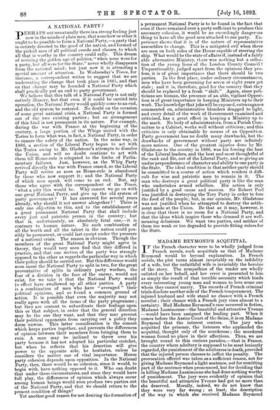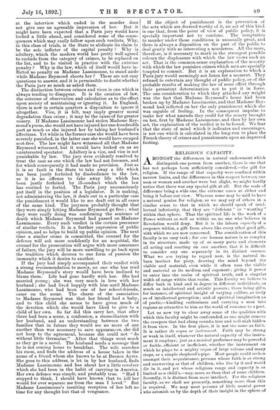MADAME REYMOND'S ACQUITTAL.
IF the French character were to be wholly judged from French novels, such acquittals as that of Madame Reymond would be beyond explanation. In French novels, the plot turns almost invariably on the infidelity of a wife, but the unfaithful wife is invariably the heroine of the story. The sympathies of the reader are wholly enlisted on her behalf, and her error is presented to him as simply the result of that terrible necessity which binds every interesting young man and woman to love some one whom they cannot marry. The records of French criminal trials disclose another side of the French temperament. The injured husband and wife stand no chance with a French novelist ; their chance with a French jury rises almost to a certainty. Had Madame Reymond's case occurred in fiction, Madame Lassimonne—the beautiful and attractive Yvonne —would have been assigned the leading part. When it comes before the Assize Court of the Seine, it is on Madame Reymond that the interest centres. The jury who acquitted the prisoner, the listeners who applauded the acquittal, thought only of the murderess ; the murdered woman found no place in their affections. Thus, we are brought round to this curious paradox,—that in France, the country where adultery is supposed to be most leniently regarded,the punishment of the adulteress is death, provided that the injured person chooses to inflict the penalty. The provocation offered was taken as a sufficient reason, not for giving Madame Reymond alight sentence, not for remitting part of the sentence when pronounced, but for deciding that in killing Madame Lassimonne she had done nothing worthy of punishment. The jury were evidently of opinion that the beautiful and attractive Yvonne had got no more than she deserved. Morally, indeed, we do not know that they were very far wrong ; at least, the description of the way in which she received Madame Reymond at the interview which ended in the murder does not give one an agreeable impression of her. But it might have been expected that a Paris jury would have looked a little ahead, and considered some of the conse- quences which may easily follow upon such verdicts. Why, in this class of trials, is the State to abdicate its claim to be the sole inflicter of the capital penalty ? Why is adultery, which the modern world has pretty well agreed to exclude from the category of crimes, to be replaced on the list, and to be visited in practice with the extreme penalty ? Why is the law, which of itself would have in- flicted no penalty on Madame Lassimonne, to stand aside while Madame Reymond shoots her ? These are not easy questions to answer, and it is permissible to doubt whether the Paris jury so much as asked them.
The distinction between crimes and vices is one which is always tending to disappear. It is the creation of law, the outcome of observation and calculation as to the effect upon society of maintaining or ignoring it. In England, there is now in certain quarters a disposition to ignore it altogether. Vice, it is felt, may imply greater moral degradation than crime ; it may be the cause of far greater misery. If Madame Lassimonne had stolen Madame Rey- mond's purse, she would not have injured her one-hundredth part as much as she injured her by taking her husband's affections. Yet while in the former case she would have been severely punished, in the latter case she would have escaped scot-free. The law might have witnessed all that Madame Reymond witnessed, but it would have looked on as an uninterested spectator. Adultery is a vice, and vice is not punishable by law. The jury were evidently resolved to treat the case as one which the law had not foreseen, and for which consequently it had made no provision. Just as it is no fault in the State to take away a life which has been justly forfeited by disobedience to the law, so it is no offence to take away life which has been justly forfeited by ill-conduct which the law has omitted to forbid. The Paris jury unconsciously put itself in the position of a legislator. It is making, not administering the law, it deals out in a particular case the punishment it would like to see dealt out in all cases of the same kind. The jurymen probably thought that they were simply letting Madame Reymond go free ; what they were really doing was confirming the sentence of death which Madame Reymond had passed on Madame Lassimonne. Every such verdict is the certain precursor of similar verdicts. It is a further expression of public opinion, and so helps to build up public opinion. The next time a similar crime is committed, the counsel for the defence will ask more confidently for an acquittal, the counsel for the prosecution will argue with more assurance of failure, the jury will be more unwilling to go back upon the tradition which decrees to one form of passion the immunity which it denies to another.
If the jury had simply accompanied their verdict with a strong recommendation to mercy, no one who has read Madame Reymond's story would have been inclined to blame them. Life had gone hardly with her. She had married young ; she was very much in love with her husband ; she had lived happily with him until Madame Lassimonne, who had been one of her school-friends, came on the scene. The charm of the association to Madame Reymond was that her friend had a baby, and to this child she seems to have given much of the devotion which she would have liked to give to a child of her own. So far did this carry her, that after there had been a scene, a confession, a reconciliation with her husband, and an understanding between the two families that in future they would see no more of one another than was necessary to save appearances, she did not keep to the agreement, because she could not " do without little Germaine." After that things went much as they go in a novel. The husband sends a message that he is not coming home to breakfast. The wife searches his room, and finds the address of a house taken in the name of a friend whom she knows to be at Buenos Ayres. She goes to this address, is let in by her husband, finds Madame Lassimonne. and has about her a little revolver which she had been in the habit of carrying in America. Her own defence was simple, and probably true. " Had I stopped to think, I should have known that to kill her would for ever separate me from the man I loved." But Madame Lassimonne's insulting reception of her left no time for any thought but that of vengeance. If the object of punishment is the prevention of the acts which are decreed worthy of it, an act of this kind is one that, from the point of view of public policy, it is specially important not to condone. The temptation to murder under these conditions is unusually great, and there is always a disposition on the part of the public to deal gently with so interesting a murderess. All the more, therefore, is it necessary to mark in the strongest possible colours the displeasure with which the law views such an act. That is the common-sense explanation of the severity with which the law punishes crimes which men are specially tempted to commit. But it is an explanation to which a Paris jury would seemingly not listen for a moment. They refused to entertain any thought of public policy, or of the probable results of making the law of none effect through their persistent determination not to put it in force. The one consideration to which they attached any weight was the fact that Madame Reymond's home had been broken up by Madame Lassimonne, and that Madame Rey- mond had inflicted on her the only punishment which she was capable of feeling. In the consequent impulse to make her what amends they could for the misery brought on her, first by Madame Lassimonne, and then by her own act, the explanation of the verdict is to be found. We fear that the state of mind which it indicates and encourages, is not one which is calculated in the long-run to place the French theory of crimes and punishments upon an improved footing.



































 Previous page
Previous page